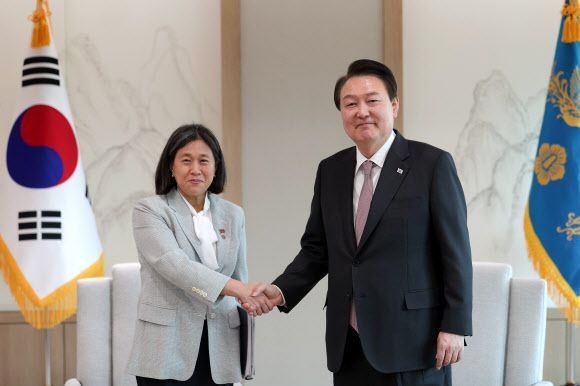Photo: President Yoon Suk-yeol (right) greets US Trade Representative Katherine Tai, who was visiting South Korea on March 30. Credit: Office of the President.
The continuing effort by the United States to safeguard from Chinese influence the supply chain of strategically critical products, such as semiconductors and electric vehicles, has been putting South Korean corporations in an awkward position. Washington’s latest salvo is the CHIPS Act, a law that incentivizes leading South Korean companies to manufacture semiconductors within the United States.
When the Biden administration announced the CHIPS Act in August 2022, it was hailed for the USD 39b subsidies for Asian semiconductor makers - such as Taiwan’s TSMC and South Korea’s Samsung Electronics 삼성전자 and SK Hynix SK하이닉스 - to construct chip-making factories within the United States. But on March 27, the guidelines issued by the US Department of Commerce caused an uproar in Korea.
In order to collect the subsidies, manufacturers must submit a detailed report containing key information for its business, including production capacity for different types of semiconductors, raw material costs, and expected yield for wafers. The required disclosures would contain highly confidential trade secrets, as one could piece together the entire manufacturing process in detail based on the information.
Pointing to the “betrayal” in the Inflation Reduction Act, in which the US cut off subsidies for South Korea’s electric vehicles, Korean media angrily surmised that the CHIPS Act is an attempt for the United States to steal critical technology over the long term. (See previous coverage, “US Stab in the Back for EV.”) Some experts have called for South Korean corporations to reject the subsidies. Kim Du-sik, a trade attorney and former managing partner of Shin & Kim, a major law firm, said: “It is difficult to put a price on ‘giving up everything.’” In a March 30 shareholder meeting, SK Hynix said it was “undecided” as to whether to apply for the US subsidy.
The US demand adds another layer of difficulties for South Korea’s chips manufacturers. Responding to Washington’s request to build factories on US soil, Samsung Electronics pledged to invest USD 200b over the next two decades to construct eleven new semiconductor production lines in Texas, while SK Hynix is close to unveiling a brand new USD 15b chip plant in Georgia.
Even with the subsidies, these investments made little economic sense. According to Boston Consulting Group, the total cost to construct and operate a cutting-edge semiconductor plant is 29% higher in the United States compared to South Korea, due to higher labor costs and inefficient US infrastructure. But Korean corporations are all but forced to build factories in the US at a loss as a hedge against the possibility of being compelled to reduce production capacity in their factories located in China as the US-China rivalry intensifies. Without the CHIPS Act subsidies, the loss will become even deeper, making South Korean chip makers less competitive overall.








